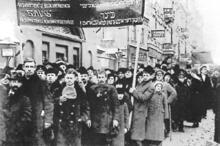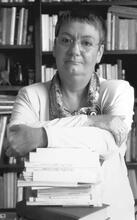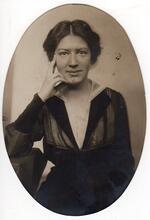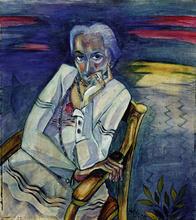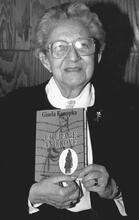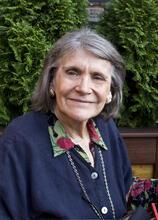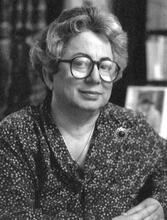Johanna Löwenherz
Raised in a German middle-class family, Johanna Löwenherz changed her political allegiance as a young adult, abandoning Judaism and becoming involved in the socialist women’s movement. She traveled widely on behalf of the movement in order to raise consciousness, lecturing on the social, economic, and legal equality of women. Löwenherz became one of the most active representatives of the SDP in the Neuwied region, elected as a delegate to three regional party conferences. Shortly before her death in 1937 she willed her house and property to a “benevolent fund for women’s welfare.” This wish was not realized until 1985, when Neuwied took over her inheritance and established a fund to present an award in her name, recognizing women who have contributed to women’s issues.
Article
Even today it is difficult to reconstruct Johanna Löwenherz’s biography in full. She was born on March 12, 1857, in Rheinbrohl and according to her biographer, Wolfgang Dietz, was “the daughter of a well-to-do Jewish family and brought up in the Jewish faith” (Dietz 1989, 31). Her father, Hermann Löwenherz (1811–1897), was a businessman who owned a quarry. Her mother was Fanni, née Jacobsohn (1826–1902). Little is known about Löwenherz’s education, though Cornelia Kunze claims that she studied piano and singing at the Conservatory in Stuttgart and was able to teach Esperanto.
Although by upbringing she was closest to the middle-class women’s movement, Löwenherz switched to the socialist women’s movement, on whose behalf she traveled widely in order to raise consciousness. According to Dietz, this change in her political allegiance led her to abandon Judaism. She was one of the most active representatives of the Social Democratic Party (SDP) in the Neuwied region and co-founder of the local Volksbildungsverein (Association for Popular Education). Although her political opinions made her a somewhat controversial figure in the SDP, she was nevertheless elected as a delegate to the regional party conferences in Duisburg (1895), Essen (1897), and Neuweid (1897).
She lectured on the social, economic and legal equality of women and opposed the stand of the left wing in her party, which was led by Clara Zetkin and the other revolutionaries. Her political convictions, especially regarding women’s issues, found expression in her major work, a monograph entitled Prostitution oder Produktion, Eigentum oder Ehe? Studie zur Frauenbewegung (Prostitution or Productivity, Property or Marriage? A Study for the Women’s Movement, Neuwied, München: 1895).
Persecuted by the Nazis because of her political opinions, Löwenherz was under arrest from April 14 to May 5, 1933. In a local register of leading political personalities of the KPD (Communist Party), SPD, and trade unions, compiled on December 7, 1933, her name was listed in connection with the KPD. However, it is unclear whether she did indeed transfer from the SPD to the KPD. On April 4, 1937, shortly before her death on May 17, she willed her house and property to a “benevolent fund for women’s welfare.” Since National-Socialism prevented the fulfillment of her will, 38 years elapsed before a new executor was appointed in 1984, who instructed the Neuwied city administration on the issue.
On July 30, 1985, Neuwied took over her inheritance, establishing a fund to present an award in her name, to recognize women who have contributed to women’s issues. The first Johanna Löwenherz Prize was awarded to Simone Veil on July 17, 1987.
Selected Works
Der Drachenfels. Neuwied, Berlin: 1890 (non-political essay).
Prostitution oder Produktion, Eigentum oder Ehe? Studie zur Frauenbewegung. Neuwied, München: 1895.
Wird die Sozialdemokratie den Frauen Wort halten? Neuwied: 1895.
Dietz, Wolfgang. Johanna Löwenherz. Eine Biographie. Published by the city administration of Neuwied on the 130th anniversary of her birth, the fiftieth anniversary of her death and the founding of the Johanna Löwenherz Fund. Neuwied: 1987.
Kunze, Cornelia. Wer war Johanna Löwenherz? Oder der Versuch der Skizzierung des Lebens einer politisch engagierten Jüdin in Deutschland um die Jahrhundertwende (Who was Johanna Löwenherz? or, An attempt at sketching the life of a politically involved Jewish woman in Germany at the turn of the century). Unpublished MS, n.d., 8 pages.
Jüdische Frauen im 19. Und 20. Jahrhundert: Lexikon zu Leben und Werk. Edited by Jutta Dick and Marina Sassenberg. Reinbek: Rowolht, 1993.

